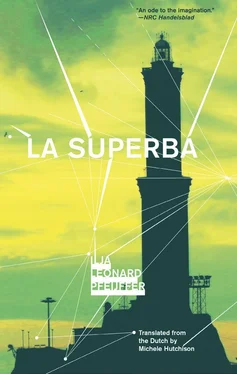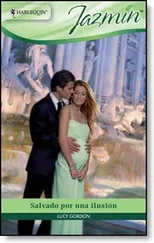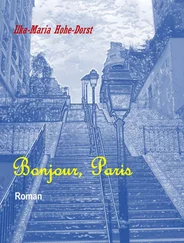I’ve observed it many times and constantly ask myself why the paying clientele have to be so brutally disappointed. What kind of peculiar take on customer relations is that? The witch sits there with the cards in front of her making everything up, so why not make up something nice, I’d say. Then at least they’d come back. But I’ve realized that that was a naive thought. People go to her with problems. Her job is to take those problems seriously, to emphasize them and magnify them. Everything is much worse than you thought. That’s true customer relations. If she said that it wasn’t really all that bad, you’d go home whistling and wouldn’t return because the problem would be gone. If, on the other hand, she said with a concerned smile that she was sorry to have to admit that all your concerns were justified and that the situation was even a little worse than you thought, you’d come back a week later with your worsened problems and quiver nervously as you ask whether the cards have something a little more favorable to say now. She’d shake her wise, old head with a smile. Of course she could pretend. But she’s not like that. She’s a good person. She’ll always tell you the truth. And the truth is lying on the table before her. Unfortunately, the cards never lie.
The witch has a name. She’s called Fulvia. I hate her. But that was perhaps clear by now.
5.
I went to the theater yesterday. The play wasn’t very interesting. It consisted of a succession of three short monologues from the perspectives of three different people who had fled the poverty of early nineteenth-century Italy and emigrated to La Merica, as they consistently called the Promised Land on the other side of the Atlantic. The texts were based on authentic letters and diary extracts. It was interesting material, and the artistic goal of holding up a mirror from the past to the current immigration problems was certainly legitimate, but the construction of three monologues was much too static and the piece devoid of any kind of dramatic tension.
I went because I’d been invited by the play’s director, Walter, a very young man I met a few weeks ago in Zaccharia, the café next to the Mandragola, on the minuscule, well hidden square in front of the old Roman church of San Cosimo and San Damiano. The bar was frequented by all kinds of arty folks, mainly actors and actresses, and that was exactly why I didn’t go there very often. Put a couple of dozen, in their eyes very talented and scandalously underappreciated, thespians in one room and before long the atmosphere will be somewhat fraught and hysterical. What’s more, they all know I’m a writer and conveniently assume that I’m just as underappreciated as they are. Why else would I be in the Zaccharia? Right. That’s the question I ask myself.
But Walter is a decent guy. At least he doesn’t complain. He’s a foreigner and that has something to do with it. Like me, he comes from the north. He is, if I remember correctly, half Danish and half French, born in Switzerland, and he’s worked all over the place, mainly in England, Germany, and Spain. Thanks to his northern European background, he is characterized by a measure of sobriety and refreshing realism. Or you could say that the fact he lacks Italian genes deprives him of the talent to wallow melodramatically in typical Italian self-pity, deriving from a paradoxical mix of conceitedness and an inferiority complex. Instead of drowning his frustrations, bitterness, and anger at the disgusting, degenerate world in which there is apparently no place left for high art amid grimly nodding like-minded people, he does something about it. Instead of waiting next to his telephone with a perpetually gloomy expression for the big job that never comes, he organizes small performances with actors he’s friendly with. Bits and pieces. An adaptation of Kafka short stories in the cellars of Bar Il Conte in exchange for free drinks; improvised cabaret in Anna’s nightclub for a hundred euros a night; an outdoor performance on the square after which the prettiest actress goes around with a hat — that kind of thing. They aren’t particularly impressive productions that will give a good gloss to his CV, but in any case he’s doing something.
And so now it’s that play with the three monologues about Italian emigration in a tiny theater on Piazza Cambiaso in the red light district close to Via della Maddalena. It wasn’t his own idea, he was asked to stage it. And he was the first person to agree with me that it lacked dramatic development and was actually a complete failure as a play. He’d played around a bit with the letters and diary fragments the actors had given him, but he wasn’t a writer, he admitted it outright. Maybe I’d be able to take a look at it? The material was indeed interesting, wasn’t it? There had to be a lot more to be had from it? I nodded. Maybe.
But the play wasn’t the main reason he’d invited me. It was the theater. He gave me a tour after the show. It was a modest but exquisite renaissance palazzo with marble columns and frescoes by a pupil of Michelangelo. It had recently been wonderfully restored. A majestic marble staircase led to the upstairs floor where there was a tastefully furnished bar and small restaurant. The hall with columns and Gothic vaults on the ground floor gave access to the theater. It was intimate, no more than a hundred seats. But it was ultramodern, completely decked out in the technical sense and maximally flexible with a completely collapsible stage, state-of-the-art audio equipment, and an arsenal of lights that many a technician from a big theater would find delectable. It was a polished pearl, a brilliant jewel, hidden in the deepest depths of the labyrinth.
“And do you know what the most remarkable thing is?” Walter said. “They hardly do anything with it. The current owners don’t have a clue how to run a theater. They want to get rid of it. They’ve put it up for sale and already asked me if I might be interested. Of course I’m interested. It’d be a dream. But it’s impossible for me to organize it all on my own. And that’s why I thought of you, Ilja. How would you like to buy this theater with me?”
6.
I was honored that Walter clearly had that much faith in me, but of course I wasn’t going to buy a theater. I’d never wanted to do that, so why would I suddenly want to do it now? Apart from that, I didn’t have any money. So it was an easy decision.
I was charmed by the idea of doing something with the witness accounts of the great Italian emigration. Walter was right. It was fine material. And there was undoubtedly a lot more in the archives than these few letters and diary fragments he’d worked into his play. It had all happened a relatively short time ago. The two major emigration waves of Italians leaving for the United States or Latin America were at the end of the nineteenth and the beginning of the twentieth centuries. It was a movement of unprecedented scale, a true mass migration. I’d googled the figures and was shocked by them. The various sources I could quickly put my hands on were more or less in agreement that between 1860 and the beginning of the Second World War, a total of around twenty million Italians risked the crossing to the Promised Land on the other side of the Atlantic. Pause and let the magnitude of that sink in, my friend. Twenty million. That’s almost a third of the current population of Italy. That’s twenty-five percent more than the total population of my home country, infants and the elderly included. I know you can’t use the figures like that because those twenty million Italians emigrated over a period of eighty years, but still, to get an idea of the gigantic dimensions; imagine if a third of the population moved somewhere else, or in the case of my home country, more than the total population. The entire country would be left empty. No one would live there anymore. Everyone gone to America. And then us in Europe worrying when a few hundred Senegalese get washed up on Lampedusa.
Читать дальше












